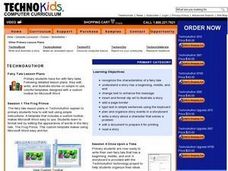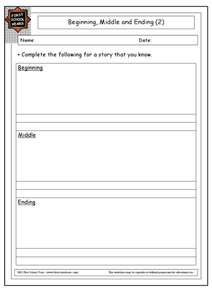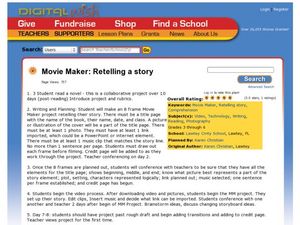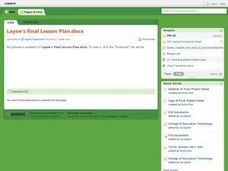Student Handouts
Beginning-Middle-End Chart
Track the plot of a book with a straightforward chart. Pupils write in the title of the book and then note down what happened at the beginning, middle, and end of the story.
Curated OER
Beginning, Middle, Ending of Story
In this retelling a story in order worksheet, students write short answers for the beginning, middle and end of a story of their choice. Students compete three parts of the worksheet.
Curated OER
Techno Author
Here is a great way to explore language arts by completing a computer activity with classmates. Youngsters read a fairy tale in class and analyze where the beginning, middle and end are. They create their own story using clip art and...
Curated OER
Where Do We Begin?
Primary learners grasp sequence of events by discussing morning routines and reviewing the story of Little Red Riding Hood. They explore the necessity of correct order of events. As a class, create a story with a beginning, middle, and...
Curated OER
Story Stick Medallions
Students identify and visually represent important events in the beginning, middle, and end of a story. They arrange the pictures in sequential order. Students verbalize details while they retell their story idea to friends and family...
Curated OER
Beginning, Middle, Ending (2)
In this story structure worksheet, students use a story map and write down the beginning, middle, and ending of a story they know.
Curated OER
Printable Story Starter: Treasure in the Daisies
Class members can practice using sensory details and imagery with this writing prompt, which provides a vivid introduction about a girl who discovers a treasure box in her mother's garden. The middle, ending, and title of the story are...
Curated OER
Movie Maker: Retelling a Story
Using Movie Maker, sixth graders make an eight frame movie based on a story they have written. They choose music clips, select pictures from PowerPoint, and make their movie. The lesson should take about ten days to complete.
Curated OER
Fairy Tales
Once upon a time are four words most children are familiar with when reading a fairy tale. But do they know that fairy tales are a great way to learn the literary elements of reading and writing? Use a thorough fairy tale unit...
Curated OER
Story Structure Slide Show
Analyzing the sequence of actions in dramatic stories leads to deeper comprehension of story structure. The class identifies the main actions in each section of a story and develops frozen tableau's for the identified actions of the...
Curated OER
Tell A Visual Story
Pupils become aware of a story's sequence by identifying a story's beginning, middle/climax and end. They utilize their auditory and visual/kinesthetic abilities to interpret, organize, and represent a story's sequence in original pictures.
Curated OER
Crater Creation
After looking at the back of a quarter featuring Oregon terrain, learners distinguish between fiction and non-fiction and identify the beginning, middle and end of a story. First, they listen to legends that describe the creation of...
Curated OER
Build Mastery: Sequencing
Writing a summary is much easier once you've laid out the sequence of events. Show readers how these two skills are intertwined using this graphic organizer. Review the meaning of sequencing first, presenting the chart and possibly...
For the Teachers
Story Strips Sequencing
What happens next? Work on story sequence with a lesson that prompts kids to put a story back in order. Additionally, they discuss what would happen if one event was missing from the sequence.
Curated OER
Writing: Mentor Text Lesson & Microteaching
Mentor texts are a great way to demonstrate how to write with purpose. Pupils will be reintroduced to two well-known books and then asked to think about them from the writer's point of view. They will see that the author had to use basic...
Curated OER
Write a Story
Here is a great way to explore narrative writing! Learners review a previously constructed story map and identify the characters, setting, and main events in the book Anansi and the Moss-Covered Rock retold by Eric A. Kimmel. They...
Curated OER
Story Train
In this story sequencing worksheet, students will record the beginning, middle and ending of the book that they are reading on a graphic organizer in the shape of a train.
Hawaiʻi State Department of Education
Story Design
Stories contain very specific elements; plot, characters, and key events. Learners use pantomime to retell a key event from the beginning, middle, and end of a story. They discuss setting and character as each group discusses and then...
Curated OER
Printable Story Starter: The Get-Away
This fun, creative writing prompt invites young writers to continue the story of Boe and Tim, who discover a hot air balloon while escaping from their big sisters. The worksheet provides a space where learners can finish the middle and...
Curated OER
Monitoring Comprehension Progress: Story Retells
Pupils retell a story by filling out a record sheet. In this retelling lesson plan, students fill out a record sheet that gives them prompts about the beginning, middle, and end of a story.
Curated OER
Telling a Story
Young scholars create a story about a picture. For this writing lesson, students select a picture and write a story about what happened in the picture. Young scholars are encouraged to write a story with a beginning, middle, and end.
Curated OER
Animation Pre-Production
Does your class love reading cartoons? Use their talents and interests to examine the process of writing a story they wish to tell through a cartoon. They develop the beginning, middle, and end of a story based on their original...
Curated OER
Sequencing in Reading
Third graders explore language arts by analyzing a children's story in class. In this story structure instructional activity, 3rd graders read the book The True Story of the Three Little Pigs and write a brief summary. Students identify...
Curated OER
Writer's Workshop Mini-Lesson Plan- Story Sequencing
Students listen to a read aloud of Kevin Henkes, Owen, while listening for the beginning, middle, and end. They listen as the teacher describes the need for story organization and write down the story sequence. Finally, they create a...























